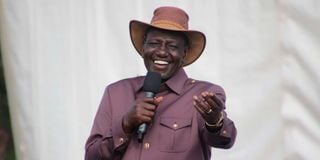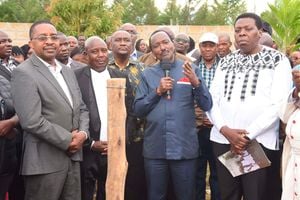
President William Ruto addresses wananchi moments after the commissioning of Changachicha Irrigation project in Nyeri County on February 15, 2024.
President William Ruto appears to be tightening his grip on power, with a 'compliant' parliament and his recent overtures to the opposition and the consolidation of power in his own party to help him push through his agenda.
Political analysts now see his latest move to endorse opposition leader Raila Odinga for the chairmanship of the African Union Commission, which will be accompanied by a major government-led campaign across the continent over the next eight months, as his latest attempt to deflate dissent after a turbulent period rocked by opposition-led street protests that destabilised him before a ceasefire deal calmed things down.
President Ruto also seems to be scoring big at the counties, with governors, though unhappy with the proposed allocation, and want Sh450 billion, happy to honour his invites and have pledged their support for him.
On the international level, President Ruto seems to be enjoying massive United States support, with President Joe Biden set to host him on a State visit in May, and having just recently been elected to lead reforms at the African Union, taking over the big role from Rwanda’s Paul Kagame.
In his own party, United Democratic Alliance (UDA) and the Kenya Kwanza Coalition, President Ruto seems to be in total control, having nipped in the bud initial disgruntlement—and having pushed a potentially contentious grassroots elections to April, from December last year.
His re-organisation of the Executive to give clear roles to Deputy President Rigathi Gachagua and Prime Cabinet Secretary Musalia Mudavadi also scored him big to tame potential flashpoints in the top government service.
And despite opposition and challenges, President Ruto has managed to ram through his pet projects: Housing, a new health system and laws, and new taxing regimes in a short 18 months.
But State House press secretary Emmanuel Talam insists that the suggestion that the president was tightening his grip on power, especially on Parliament, was an “unfair judgment.”
In parliament, Mr Talam says, President Ruto had succeeded by persuading the legislators, not any other means.
“The fact that the president through his parliamentary leadership can marshal support across the political divide doesn’t mean he’s muzzled it. We have commissions that are always criticising the president and even overturning some of his decisions or those of his government!” Mr Talam told Sunday Nation.
He went on: “When the president just like everyone else disagrees with a court ruling it doesn’t mean he has a run with the judiciary! Would you say the Judiciary has a run-in with the president when it rules against his decisions or policies? We should not be one-sided in our view of things. Be objective.”
A source within the presidency said President Ruto was misunderstood, “as he is not a hands-off person and personally supervises every project or programme his government undertakes.”
For President Ruto, questions over his tightening grip on power began right after his declaration as the winner of the elections in August 2022, when he convinced parties in Mr Odinga’s Azimio la Umoja One Kenya Coalition to join his camp, assuring that he had the majority in parliament, whose first role was to vote in Speakers Moses Wetang’ula (National Assembly) and Senate’s Amason Kingi.
National Assembly Minority Leader Opiyo Wandayi warned that the power amassing plan will not work, citing similar moves by former president Daniel arap Moi.
“If Moi didn’t kill opposition, no one will. The opposition has remained steadfast, alive and kicking. Ruto’s support for Raila has nothing to do with opposition status in the country,” said Mr Wandayi.
National Assembly Minority Whip Junet Mohammed argues that no one can underestimate the power of the people.
“The Vanguard of a country is the people. Not politicians, not even the church. This situation will be sorted by the people,” said the Suna East MP.
He added: “It has been done before during the Kanu era and after and into the future. What is happening now is the short-lived assumption the people are thinking.”
Orange Democratic Movement chairman and nominated MP John Mbadi says the president must not take the constitution for granted, by trying to muzzle the powers of other institutions.
“Kenyans will not accept dictatorship. Trying to tinker with the independence of the institutions in the constitution is courting danger and might lead to a revolution,” warned Mr Mbadi.
According to political analyst Martin Oloo, President Ruto’s style of leadership can be interpreted as that of a total man, who is in total control.
Imperial president
“President Ruto has positioned himself as the quintessential African strongman. Constitution with the checks and balances is on paper,” said Mr Oloo, stated, making reference to the late Prof Okoth Ogendo’s study on “constitutions without constitutionalism.”
Mr Oloo went on: “He is the epitome of an Africa imperial president, not accommodative to divergence opinions. The constitution is on paper but he wields the real power.”
He recalled that when President Ruto assumed office, his first move was to get numbers in parliament, signing post-election pacts with Azimio la Umoja One Kenya Coalition parties.
“He went on a buying spree. He got the numbers to take over the majority leadership in both Houses,” said Mr Oloo.
He went on, “Akin to the Handshake between Mr Odinga and Mr Kenyatta, the president has affirmed his support for Mr Odinga’s Africa Union Commission chairperson bid.”
Mr Oloo argues that based on the latest development, the Bills the two leaders have interest in will be fast-tracked and Kenyans will be shortchanged.
Already both Houses have debated and adopted the National Dialogue Committee (NADCO) report that was co-chaired by Majority Leader Kimani Ichung’wah and wiper Leader Kalonzo Musyoka.
Just like the Building Bridges Initiative (BBI) spearheaded by Mr Kenyatta and the opposition after the March 9th, 2018 Handshake, which was overwhelmingly passed by MPs before the court stopped the push to amend the constitution, terming it unconstitutional, Mr Oloo expresses same fears with the NADCO report.
Nine Bills have jointly been sponsored by Mr Ichung’wah and Mr Wandayi following the adoption of the NADCO report by parliament.
Power play
Mr Oloo argues that the power play for President Ruto also cuts to who he appointed to Cabinet and other top positions.
“It is by design for the president to appoint people in his Cabinet without prior public service experience, this is Executive presidency where power and decision-making rests with one person. He has also appointed his advisors domiciled at State House, to help him run his government, locking out the experts,” said Mr Oloo.
But National Assembly Road committee chairman George Karuiki, an ally of the president, disagrees, saying the president is a democrat and a progressive leader.
“He consults widely on all issues. It is not true that he makes unilateral decisions. He persuades on legislative issues,” said Mr Karuiki. The Ndia MP added, “He does not impose anything on us. He tells on what to do as he respects the autonomy of parliament. He is very persuasive if we are convinced his policies are good for the country we support.”
Mr Karuiki said UDA MPs don’t just adopt everything from the Executive as alleged.
“If the president’s ideas are good, they carry the day and vice versa,” he stated.
Vihiga senator Godfrey Osotsi also weighed in on the debate, faulting system gaps which President Ruto has exploited to circumvent the law. “MPs should not manage the National Government Constituency Development Fund (NG-CDF). This is what the executive is using to control them,” said Senator Osotsi.










